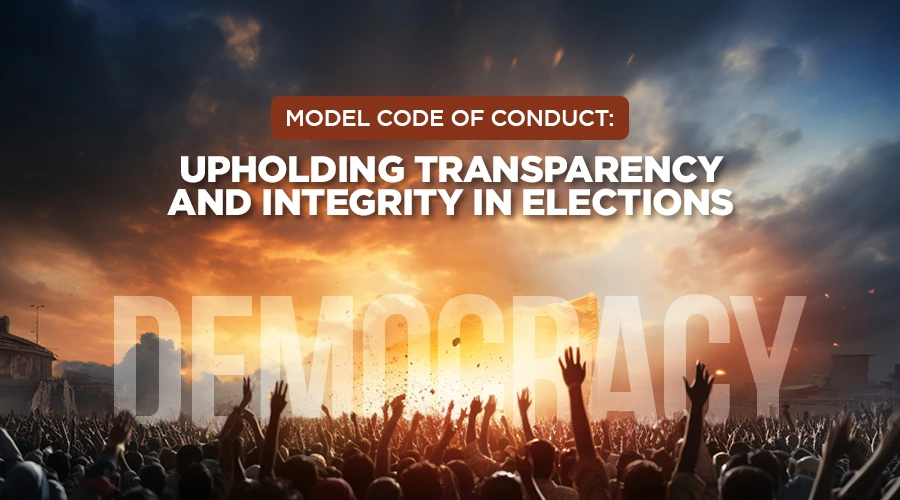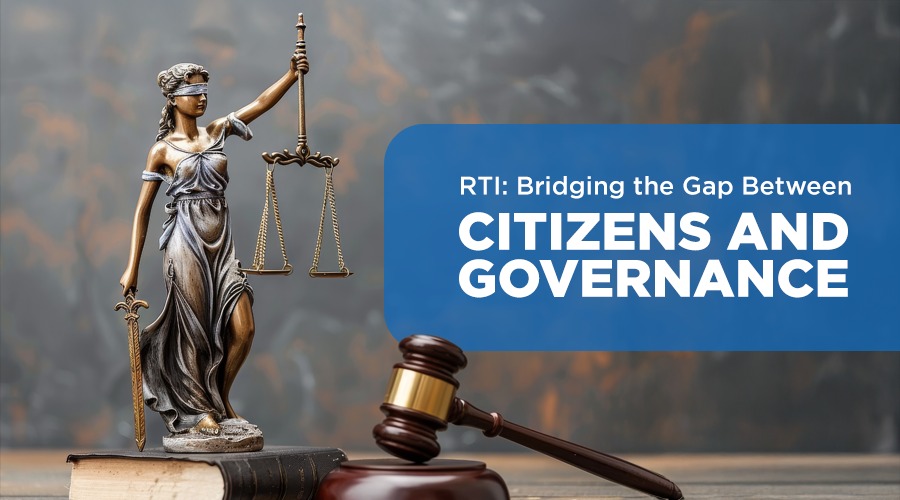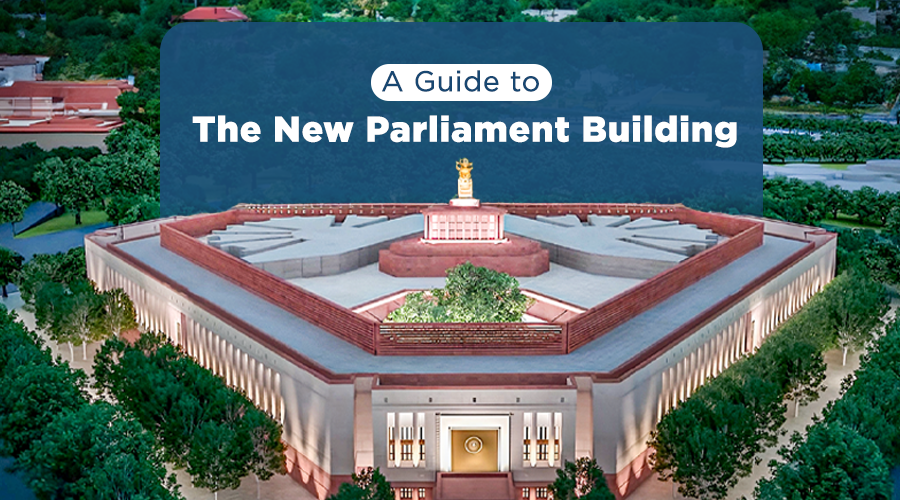The Model Code of Conduct (MCC), a meticulously crafted ethical framework by the Election Commission of India (ECI), stands as a beacon of integrity in electoral contests. Its primary objective is to uphold the principles of fairness, integrity, and transparency throughout the electoral process. Enshrined within its provisions are guidelines that aim to maintain the sanctity of elections and ensure a level playing field for all candidates and political parties. Emerging from the political crucible of the 1960s, the Model Code of Conduct stands as a bulwark against malpractice and undue influence.
The Model Code of Conduct is a set of guidelines designed to mitigate the influence of unethical practices and monitor political behaviour during the electoral cycle. Violations of the code attract strict punishment by the election body responsible for overseeing the polling process. As India’s vibrant democracy navigates the modern governance, the significance of the Model Code of Conduct remains paramount ensuring clarity and integrity in the electoral process.
From regulating campaign conduct to curbing the undue influence of money, the Model Code of Conduct encapsulates the essence of ethical electoral practices. Let us delve into the origin and the key tenets of this foundational document, highlighting its impact on India’s electoral landscape.
Inception of Model Code of Conduct:
The roots of the Model Code of Conduct trace back to the Assembly elections of Kerala in 1960, where the State administration introduced a preliminary ‘Code of Conduct’ aimed at regulating the behaviour of political parties. This initiative gained momentum during the Lok Sabha elections in 1962, when the Election Commission of India (ECI) disseminated the code to all recognized political entities and State governments. Embraced wholeheartedly, it marked a significant step towards ensuring fairness and decorum in electoral processes.
However, it wasn’t until 1991, amidst persistent violations of election norms, that the Election Commission resolved to enforce the Model Code of Conduct with greater rigour. The Model Code of Conduct comes into force immediately upon the announcement of the election schedule by the Commission and remains effective until the result announcement.
The Key Tenets as Outlined by Election Commision of India:
Model Code of Conduct endeavours to curtail practices deemed corrupt under its provisions, thereby fostering an environment conducive to free and fair elections. For instance, politicians are prohibited from making hate speeches, stoking communal tensions, invoking religious sentiments, or offering promises of new projects that could unduly influence voters. Take a look at some key tenets outlined by ECI.
I- General Conduct
1- Parties and candidates must avoid actions that worsen divisions or stir up animosity between different castes, communities, religions, or languages.
2- Parties and candidates should only criticise other political parties based on their policies, track record, and public work. Criticism should not extend to private matters unrelated to their public duties.
3- No appeals to caste or religious sentiments should be made to garner votes. Places of worship like mosques, churches, and temples should not be used for election campaigning.
4- All parties and candidates must refrain from corrupt practices and offences under election laws. This includes bribery, voter intimidation, impersonation, campaigning within 100 metres of polling stations, holding public meetings 48 hours before polling, and providing transportation to voters.
5- Every individual’s right to a peaceful home life should be respected, regardless of their political views or activities.
6- No party or candidate can allow their followers to use anyone’s property without permission for displaying flags, banners, notices, or slogans.
7- Parties and candidates must ensure their supporters do not disrupt or obstruct meetings and processions organised by other parties.
II- Meetings
1- Parties or candidates must inform local police about meeting details in advance for traffic control and maintaining peace.
2- Before holding a meeting, parties or candidates should check for any existing restrictions or prohibitions in the area. If exemptions are needed, they should be applied for early.
3- If using loudspeakers or other facilities for a meeting requires permission or a licence, parties or candidates should apply for and obtain them well before the event.
4- Meeting organisers should ask the police for help if there are disruptions or disorderly conduct. They should not take action against troublemakers themselves.
III- Procession
1- Parties or candidates planning a procession must decide on the start time, route, and end point beforehand, sticking to the plan without deviations.
2- Organisers must inform local police in advance about the procession details for necessary arrangements.
3- Check for any existing restrictions in the areas where the procession will pass, and comply with them unless exempted by the competent authority. Follow traffic regulations carefully.
4- Ensure the procession doesn’t block traffic by planning for its smooth passage. If it’s long, divide it into segments to ease traffic congestion at road junctions.
5- Keep the procession to the right side of the road as much as possible and follow the guidance of the police on duty.
6- If multiple parties plan processions along the same route, they should coordinate in advance to prevent clashes or traffic disruptions, seeking assistance from local police.
7- Parties should prevent processionists from carrying items that could be misused during moments of excitement.
8- Prohibit carrying or burning effigies representing members of other political parties or leaders, and discourage other forms of demonstrations.
IV- Polling Day
1- Work with election officers to ensure peaceful voting, letting voters cast their ballots freely without any disturbances.
2- Provide authorised workers with appropriate badges or ID cards.
3- Give voters plain white identity slips without any symbols, candidate names, or party names.
4- Avoid serving or distributing alcohol on polling day and 48 hours before it.
5- Prevent unnecessary crowds near party camps at polling booths to prevent conflicts and tension among party workers.
6- Keep candidate camps simple without posters, flags, or propaganda material. No food should be served, and crowds should be avoided.
7- Follow vehicle restrictions on polling day, obtaining permits and prominently displaying them on vehicles, while cooperating with authorities.
V- Polling Booth
1- If candidates or their agents have any complaints or issues about how the elections are being conducted, they can inform the Observers appointed by the Election Commission of India.
VI- Party in Power
1- (a) Ministers cannot mix official visits with election campaigning and cannot use official resources or staff for campaigning.
(b) Government transportation, including aircraft, vehicles, and personnel, cannot be used to support the ruling party’s interests during elections.
2- Public places like grounds for holding election meetings and helipads for flights during elections shouldn’t be monopolised by any single party. Other parties and candidates should be allowed to use them fairly.
3- Government accommodations like rest houses and dak bungalows should not be monopolised by the ruling party or its candidates. They should be available to other parties and candidates fairly.
4- Using public funds for advertisements in newspapers and other media during elections, as well as misusing official mass media for biassed political coverage or publicity, should be avoided diligently.
5- Ministers and other authorities cannot approve grants or payments from discretionary funds once the Election Commission announces the elections.
6- Once the Election Commission announces the elections, Ministers and other authorities must not:
(a) Promise any financial grants.
(b) Lay foundation stones for projects.
(c) Promise construction of roads or provision of water facilities.
(d) Make ad-hoc appointments in government or public undertakings that could influence voters in favour of the ruling party.
7- Central or State Government Ministers are not allowed to enter polling stations or counting places unless they are candidates, voters, or authorised agents.
8- Inauguration of public projects after the announcement of election date is discouraged. If unavoidable, it should be a low-key event without political speeches or celebrations.
VII- Guidelines on Election Manifestos
The Election Commission instructs political parties and candidates to follow these guidelines when releasing election manifestos for any election (Parliament/State Legislatures):
1- Manifestos must uphold the ideals and principles of the Constitution.
2- Political parties should refrain from making promises that could corrupt the election process or unfairly influence voters.
3- Manifestos should explain the reasons behind promises and give a general idea of how they will be financed.
4- Manifestos should not be released during the prohibited period, as specified under Section 126 of the Representation of the People Act 1951, for single or multi-phase elections.
Report Model Code of Conduct Breaches with cVigil App:
cVIGIL, also known as Vigilant Citizen, is a mobile application crafted by the Election Commission of India (ECI) to empower citizens in reporting violations of the Model Code of Conduct during elections. Accessible for download on both Android and iOS devices, the app offers a streamlined process for users to report infringements swiftly.
The features include:
- A platform for citizens to participate in the electoral process
- Report violations of the Model Code of Conduct
- GPS tracking of the location of the incident
- Capture the live incidents
- Report a violation anonymously
- Track the progress of the complaint
Key Takeaway:
Understanding the significance of the Model Code of Conduct is vital for citizens in ensuring the fairness and transparency of elections. While the Model Code of Conduct itself is not legally enforceable, its provisions serve as ethical guidelines that political parties and candidates are expected to adhere to during electoral campaigns. However, certain aspects of the Model Code of Conduct may be reinforced through existing legal frameworks such as the Indian Penal Code, Code of Criminal Procedure, and Representation of the People Act.
Citizens can play a crucial role in promoting responsible and ethical electoral practices by acquainting themselves with the Model Code of Conduct. By doing so, they gain the ability to hold parties and candidates accountable for their conduct throughout the electoral process. Utilising platforms like cVigil, citizens can report any violations they witness, thereby contributing to the fostering of a culture that values integrity and accountability in elections.





